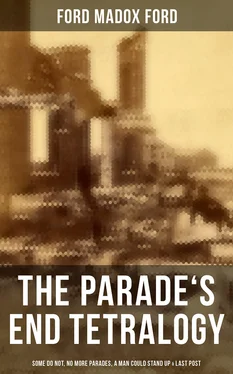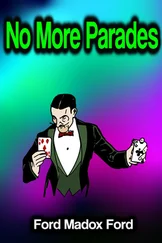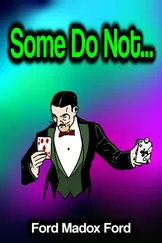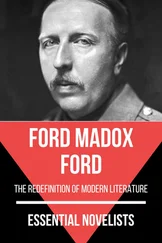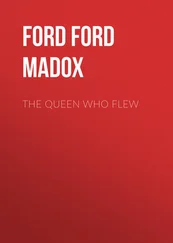She felt her eyes explore his face as the wretch in a cell explores the face of his executioner for a sign of pardon. Her heart stayed still: her breath suspended itself . . .
Then complete heaven began. Upon her left palm she felt cool fingers beneath the cloth. This man knew always the exact right action! Upon the fingers, cool, like spikenard and ambrosia, her fingers closed themselves.
In complete bliss, in a quiet room, his voice went on talking. At first with great neatness of phrase, but with what refinement! He explained that certain excesses being merely nervous cravings, can be combated if not, indeed, cured altogether, by the fear of, by the determination not to endure, sharp physical pain—which of course is a nervous matter, too! . . .
Parry, at a given moment, had said into his master’s ear:
‘It’s time you prepared for your sermon to-morrow, sir,’ and Mr Duchemin had gone as quietly as he had arrived, gliding over the thick carpet to the small door.
Then Macmaster said to her:
‘You come from Edinburgh? You’ll know the Fifeshire coast then.’
‘Do I not?’ she said. His hand remained in hers. He began to talk of the whins on the links and the sanderlings along the flats, with such a Scots voice and in phrases so vivid that she saw her childhood again, and had in her eyes a wetness of a happier order. She released his cool hand after a long, gentle pressure. But when it was gone it was as if much of her life went. She said: ‘You’ll be knowing Kingussie House, just outside your town. It was there I spent my holidays as a child.’
He answered:
‘Maybe I played round it a barefoot lad and you in your grandeur within.’
She said:
‘Oh, no! Hardly! There would be the difference of our ages! And . . . and indeed there are other things I will tell you.’
She addressed herself to Tietjens, with all her heroic armour of charm buckled on again:
‘Only think! I find Mr Macmaster and I almost played together in our youth.’
He looked at her, she knew, with a commiseration that she hated:
‘Then you’re an older friend than I,’ he said, ‘though I’ve known him since I was fourteen, and I don’t believe you could be a better. He’s a good fellow . . .
She hated him for his condescension towards a better man and for his warning—she knew it was a warning—to her to spare his friend.
Mrs Wannop gave a distinct but not an alarming scream. Mr Horsley had been talking to her about an unusual fish that used to inhabit the Moselle in Roman times. The Mosella of Ausonius; the subject of the essay he was writing is mostly fish . . .
‘No,’ he shouted, ‘it’s been said to be the roach. But there are no roach in the river now. Vannulis viridis, oculisque . No. It’s the other way round: Red fins . . . ’
Mrs Wannop’s scream and her wide gesture: her hand, indeed, was nearly over his mouth and her trailing sleeve across his plate!—were enough to interrupt him.
‘ Tietjens! ‘ she again screamed. ‘Is it possible? . . . ’
She pushed her daughter out of her seat and, moving round beside the young man, she overwhelmed him with vociferous love. As Tietjens had turned to speak to Mrs Duchemin she had recognized his aquiline half-profile as exactly that of his father at her own wedding breakfast. To the table that knew it by heart—though Tietjens himself didn’t!—she recited the story of how his father had saved her life, and was her mascot. And she offered the son—for to the father she had never been allowed to make any return—her horse, her purse, her heart, her time, her all. She was so completely sincere that, as the party broke up, she just nodded to Macmaster and, catching Tietjens forcibly by the arm, said perfunctorily to the critic:
‘Sorry I can’t help you any more with the article, but my dear Chrissie must have the books he wants. At once! This very minute!’
She moved off, Tietjens grappled to her, her daughter following as a young swan follows its parents. In her gracious manner Mrs Duchemin had received the thanks of her guests for her wonderful breakfast and had hoped that now that they had found their ways there . . .
The echoes of the dispersed festival seemed to whisper in the room. Macmaster and Mrs Duchemin faced each other, their eyes wary—and longing.
He said:
‘It’s dreadful to have to go now. But I have an engagement.’
She said:
‘Yes! I know! With your great friends.’
He answered:
‘Oh, only with Mr Waterhouse and General Campion . . . and Mr Sandbach, of course . . . ’
She had a moment of fierce pleasure at the thought that Tietjens was not to be of the company: her man would be outsoaring the vulgarian of his youth, of his past that she didn’t know . . . Almost harshly she exclaimed:
‘I don’t want you to be mistaken about Kingussie House. It was just a holiday school. Not a grand place.’
‘It was very costly,’ he said, and she seemed to waver on her feet.
‘Yes! yes!’ she said, nearly in a whisper. ‘But you’re so grand now! I was only the child of very poor bodies. Johnston of Midlothian. But very poor bodies . . . I . . . He bought me, you might say. You know . . . Put me to very rich schools; when I was fourteen . . . my people were glad . . . But I think if my mother had known when I married . . . ’ She writhed her whole body. ‘Oh, dreadful! dreadful!’ she exclaimed. ‘I want you to know . . .
His hands were shaking as if he had been in a jolting cart . . .
Their lips met in a passion of pity and tears. He removed his mouth to say: ‘I must see you this evening . . . I shall be mad with anxiety about you.’ She whispered: ‘Yes! yes! In the yew walk.’ Her eyes were closed, she pressed her body fiercely into his. ‘You are the . . . first . . . man . . . ’ she breathed.
‘I will be the only one for ever,’ he said.
He began to see himself; in the tall room, with the long curtains: a round, eagle mirror reflected them gleaming: like a bejewelled picture with great depths: the entwined figures.
They drew apart to gaze at each other: holding hands . . . The voice of Tietjens said:
‘Macmaster! You’re to dine at Mrs Wannop’s to-night. Don’t dress; I shan’t.’ He was looking at them without any expression, as if he had interrupted a game of cards; large, grey, fresh-featured, the white patch glistening on the side of his grizzling hair.
Macmaster said:
‘All right. It’s near here, isn’t it? . . . I’ve got an engagement just after . . . ’ Tietjens said that that would be all right: he would be working himself. All night probably. For Waterhouse . . .
Mrs Duchemin said with swift jealousy:
‘You let him order you about . . . Tietjens was gone. Macmaster said absently:
‘Who? Chrissie! . . . Yes! Sometimes I him, sometimes he me . . . We make engagements. My best friend. The most brilliant man in England, of the best stock too. Tietjens of Groby . . . ’ Feeling that she didn’t appreciate his friend he was abstractedly piling on commendations: ‘He’s making calculations now. For the Government that no other man in England could make. But he’s going . . . ’
Читать дальше
